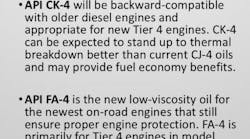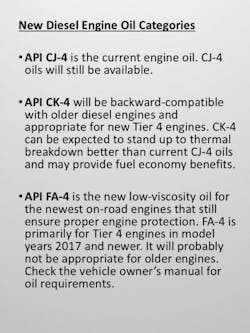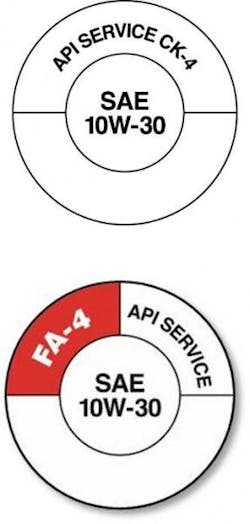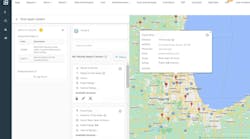Starting December 1, 2016, fleet owners will need to pay attention when purchasing new diesel engine oil. That’s when PC-11 diesel engine oils will become the new normal. (Not sure what PC-11 engine oils are all about? Check out our previous article.)
Making the transition
Once the new oils are in the market, we anticipate fleets will transition as needed from traditional CJ-4 oils to the new CK-4 formulations. The 10W-30 CK-4 engine oils will likely see the largest growth first, because they can be used in both older and new engines. As fleets add newer models designed for fuel economy, managers will begin to transition to FA-4 for servicing those fuel-efficient engines.
CHS, the nation’s largest cooperative, has used its on-road diesel fleet as a test base for the new oils. High-mileage road tests with CK-4 oil has shown a 1 to 3 percent fuel economy improvement in the CHS fleet compared with engines on typical SAE 15W-40 oil.
Efficiency gains with CK-4 oil come mostly from reduced breakdown. Lubricity, protection and efficiency is maintained longer in the drain cycle. On appropriate new engines, low-viscosity, high-tech FA-4 oil reduces friction, while maintaining engine protection for the life of the oil. Moving from CK-4 to FA-4 oil can be expected to show additional fuel efficiency gains.
Watch the label
While new CK-4 and FA-4 oils will enhance engine protection and efficiency versus current CJ-4 oils, increased oil inventory could create confusion over which oil to use for each engine.
Reading labels will help avoid mistakes. New label details will help differentiate between CK-4 and FA-4 oils, and each manufacturer will determine its own label standards. Only the API “doughnut,” or seal, will be consistent across oil marketers in communicating the proper information. Other brands may choose to color-code the circular API doughnut on the label to indicate different oil types. For CK-4 oil used in Cenex® brand lubricants, we expect the API doughnut color to be identical to the CJ-4 doughnut, because CK-4 is backward-compatible. We expect FA-4 oil to have a red quadrant in the doughnut to indicate the oil is not backward-compatible with older equipment.
Watch the oil
Regardless of oil choice, we recommend regular engine oil testing to detect oil breakdown and metal contaminants that may indicate wear on areas of the engine, such as the piston rings, cylinder liners, bearings and valve train components. Regular oil testing can help prevent relatively small maintenance needs from becoming an engine failure or major repair down the road.
With new formulations using more anti-oxidant, anti-wear, detergent and dispersant agents, these new, better-performing oils will be a positive change for fleet managers. The CHS team will help guide fleet managers who rely on Cenex premium lubricant products through the transition, and we are always available to answer questions about the right oil for each fleet. For more information, visit http://www.cenex.com.





